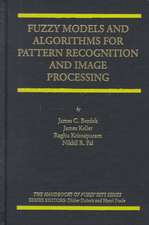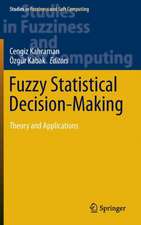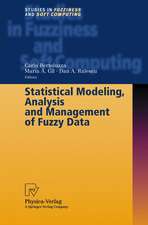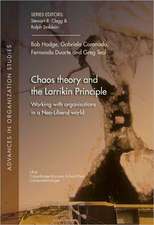Social Fuzziology: Study of Fuzziness of Social Complexity: Studies in Fuzziness and Soft Computing, cartea 107
Autor Vladimir Dimitrov, Bob Hodgeen Limba Engleză Hardback – 4 sep 2002
| Toate formatele și edițiile | Preț | Express |
|---|---|---|
| Paperback (1) | 641.34 lei 6-8 săpt. | |
| Physica-Verlag HD – aug 2012 | 641.34 lei 6-8 săpt. | |
| Hardback (1) | 647.79 lei 6-8 săpt. | |
| Physica-Verlag HD – 4 sep 2002 | 647.79 lei 6-8 săpt. |
Din seria Studies in Fuzziness and Soft Computing
- 20%
 Preț: 999.85 lei
Preț: 999.85 lei - 20%
 Preț: 653.06 lei
Preț: 653.06 lei - 20%
 Preț: 872.96 lei
Preț: 872.96 lei - 20%
 Preț: 930.57 lei
Preț: 930.57 lei - 20%
 Preț: 1051.00 lei
Preț: 1051.00 lei - 20%
 Preț: 992.44 lei
Preț: 992.44 lei - 20%
 Preț: 655.85 lei
Preț: 655.85 lei - 20%
 Preț: 1001.86 lei
Preț: 1001.86 lei - 18%
 Preț: 954.14 lei
Preț: 954.14 lei - 20%
 Preț: 330.10 lei
Preț: 330.10 lei - 20%
 Preț: 333.04 lei
Preț: 333.04 lei - 20%
 Preț: 997.56 lei
Preț: 997.56 lei -
 Preț: 391.61 lei
Preț: 391.61 lei - 20%
 Preț: 986.01 lei
Preț: 986.01 lei - 18%
 Preț: 958.56 lei
Preț: 958.56 lei - 20%
 Preț: 996.40 lei
Preț: 996.40 lei - 20%
 Preț: 999.35 lei
Preț: 999.35 lei - 15%
 Preț: 646.43 lei
Preț: 646.43 lei - 20%
 Preț: 651.57 lei
Preț: 651.57 lei - 20%
 Preț: 997.89 lei
Preț: 997.89 lei - 15%
 Preț: 641.03 lei
Preț: 641.03 lei - 20%
 Preț: 1009.74 lei
Preț: 1009.74 lei - 20%
 Preț: 992.62 lei
Preț: 992.62 lei -
 Preț: 388.72 lei
Preț: 388.72 lei - 18%
 Preț: 1223.43 lei
Preț: 1223.43 lei - 20%
 Preț: 651.42 lei
Preț: 651.42 lei - 18%
 Preț: 951.59 lei
Preț: 951.59 lei - 18%
 Preț: 948.61 lei
Preț: 948.61 lei
Preț: 647.79 lei
Preț vechi: 809.73 lei
-20% Nou
Puncte Express: 972
Preț estimativ în valută:
123.97€ • 128.69$ • 103.37£
123.97€ • 128.69$ • 103.37£
Carte tipărită la comandă
Livrare economică 22 martie-05 aprilie
Preluare comenzi: 021 569.72.76
Specificații
ISBN-13: 9783790815061
ISBN-10: 3790815063
Pagini: 212
Ilustrații: XX, 188 p.
Dimensiuni: 155 x 235 x 17 mm
Greutate: 0.48 kg
Ediția:2002
Editura: Physica-Verlag HD
Colecția Physica
Seria Studies in Fuzziness and Soft Computing
Locul publicării:Heidelberg, Germany
ISBN-10: 3790815063
Pagini: 212
Ilustrații: XX, 188 p.
Dimensiuni: 155 x 235 x 17 mm
Greutate: 0.48 kg
Ediția:2002
Editura: Physica-Verlag HD
Colecția Physica
Seria Studies in Fuzziness and Soft Computing
Locul publicării:Heidelberg, Germany
Public țintă
ResearchCuprins
1 Introduction to Social Fuzziology.- 1.1 The Basic Postulate of Fuzziology.- 1.2 The Approach of Fuzziology.- 1.3 The Project of Social Fuzziology.- 1.4 Socrates’ Wisdom at the Origin of Fuzziology.- 1.5 Principles of Fuzziology: A Social Perspective.- 1.6 Impossibility Theorems.- 1.7 Social Nature of Fuzziness.- 1.8 Human-centred Sources of Fuzziness.- 1.9 Transcending Duality and Non-duality.- 1.10 Consciousness Resonance.- 2 Bridging the Study of Complexity with Social Fuzziology.- 2.1 Complementarity and Mutual Enrichment.- 2.2 ‘Three Body Problem’ in Fuzziology.- 2.3 Chaotic Attractors of Meaning.- 2.4 Key Propositions in Social Fuzziology: A Complexity Perspective.- 2.5 Fuzzy Logic and Fuzziology.- 2.6 Fuzziology and Creativity.- 3 Understanding Fuzziness of Ourselves.- 3.1 Paradox of Mind.- 3.2 Journey towards Understanding Ourselves.- 3.3 Human Experiential Space.- 3.4 Maieutic Inquiry into the Essence of Human Dynamics.- 3.5 Empowering the Thinker.- 4 Understanding Fuzziness of Society.- 4.1 Infinite Life of Society versus Finite Lives of Individuals.- 4.2 Collective Mind: A Pile of Fragmented Knowledge.- 4.3 From Understanding Ourselves to Understanding Society.- 4.4 Lack of Wisdom in Society.- 4.5 Towards Establishment of Global Empire.- 4.6 Education and Learning in Society.- 4.7 The Health Illusion.- 4.8 Dealing with Hard Negotiation.- 4.9 Conclusion.- 5 Case Studies: Understanding Fuzzy Social Categories.- 5.1 What is ‘Australian’?.- 5.2 Use and Abuse of Fuzziness in Social Life.- 5.3 Fuzzy Borders in the Globalising World.- 5.4 ‘Mexican Americans’, ‘Chicanos’ and Santana.- 6 Fuzziness of the West and the East.- 6.1 Fuzzy Dionysos.- 6.2 Philosophy of Flux.- 6.3 Other Masters of Fuzziology from the West.- 6.4 Myths of Fuzziness.- 6.5 TheFuzzy Wisdom of Tao.- 6.6 Aboriginal Wisdom.- 6.7 Using Fuzziness of the Ancient Wisdom.- 7 Key Terms in the Language of Fuzziology.- 7.1 Fuzziness Defined.- 7.2 The Logos of Logic.- 7.3 Transformations.- 7.4 Transcendence.- 7.5 Understanding.- 7.6 The Social.- 7.7 Conclusion.- References.
Recenzii
From the reviews:
"It is a book on postmodern philosophy which employs the terminology of soft computing and the theory of chaos as a metaphor and analogy. … The authors’ ambition is to start bridging the gap between sciences and humanities. … the ideas exposed in the book may enrich the reader’s thought … . Some parts of the book may certainly be found interesting, and the book may even help some people in the development of their own worldview … ." (Libor Behounek, Neural Network World, Vol. 14 (2), 2004)
"It is a book on postmodern philosophy which employs the terminology of soft computing and the theory of chaos as a metaphor and analogy. … The authors’ ambition is to start bridging the gap between sciences and humanities. … the ideas exposed in the book may enrich the reader’s thought … . Some parts of the book may certainly be found interesting, and the book may even help some people in the development of their own worldview … ." (Libor Behounek, Neural Network World, Vol. 14 (2), 2004)



















